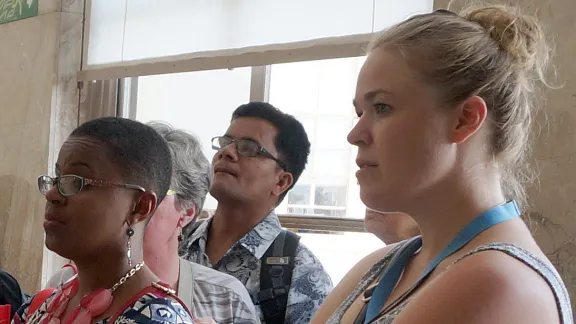
Marta Spangler, right, with workshop participants during a visit to the UN Geneva office. Photo: LWF/E. Neuenfeldt
LWF junior advocacy officer Marta Spangler attended a global advocacy training for faith-based organizations on women’s human rights, taking place in Geneva. She looks at the potential for international synergy through faith-based collaboration in human rights training.
By Marta Spangler
This is my first advocacy training experience in Geneva, but not my first experience as a planner or as a participant of trainings. But two things keep jumping out at me throughout my conversations and days with the participants here.
First, I am glad to see the collaborative effort of faith-based voices. The challenges involved to achieve this should not be underestimated. Despite many obvious commonalities, including our shared beliefs, faith-based voices have not always worked so easily together. It is easy for us to focus on differences, as this is what makes us unique. And differences have been dividing us for centuries. The multitude of Christian denominations attests to this daily. But in a more modern phenomenon, our quest for individual institutional identities, awareness campaigns, and branding all struggle to capture mere seconds of air time and attention in an increasingly competitive marketplace. I think this push to stand out and be perceived as relevant hinders us, sometimes, from collaborative activities.
We are seeing an interesting phenomenon, though. Faith-based voices, which had previously been more marginalized in the West are increasingly being invited to the table to share their knowledge and perspective. But, more often than not, this invitation is coming from a generation that hasn’t been raised as a believer. The assumption, I sometimes feel, is that faith-based perspectives will all be relatively similar. Therefore, the burden on us (usually in a very limited amount of time) is to offer instruction regarding important differences and to provide a solid faith-based argument that stands with the vulnerable and marginalized. We must do both simultaneously, in unity with one another, to make our statements as strong as possible. This is no small feat.
From all over the globe
So to hold a collaborative training is one small step in this direction, but a mighty one. Secondly, what is made possible by that collaboration is an incredible synergy and critical mass of people who are brought together. More than 30 people coming from all over the globe—Chile, Colombia, Democratic Republic of Congo, Finland, Guatemala, Haiti, Liberia, Malawi, Mozambique, Myanmar, Nepal, New Zealand, Palestine, Switzerland, Tanzania, Uganda, the United States and Zimbabwe—have been meeting at the Ecumenical Center this week. As the LWF General Secretary Rev. Dr Martin Junge mentioned on the first evening, they also bring the voices of hundreds of other witnesses from the field.
Conducting the training here in Geneva makes this kind of international synergy possible. Not only can participants engage directly with the United Nation and related agencies and experts, they also get to make valuable connections with one another. Often, when I have attended mass demonstrations in the United States, I am as moved by the speeches as I am by the crowd around me. In a small town, fighting for a cause can get quite lonely and discouraging. But when you come together, you realize you are not alone. In fact thousands of people are singing with you, fighting injustice alongside you. That gives hope and life and inspiration to keep going. And that has been incredible to witness this week.
Marta Spangler is Junior Advocacy Officer in the Office for International Affairs and Human Rights at the LWF Department for Theology and Public Witness. She participated in the 6-11 July training on Women’s Human Rights Advocacy, organized jointly by the LWF, WCC, Finn Church Aid, World YWCA and ACT Alliance.


